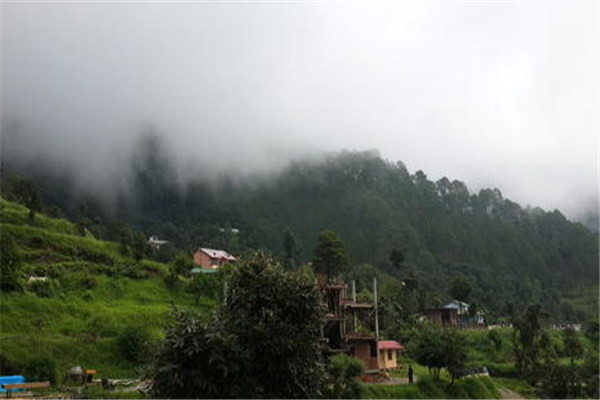Uttarakhand on the anvil of new land laws : Is it justified?
‘Don’t wait to buy land.Buy land and wait’—-Will Rogers
By
COLONEL SATISH SINGH LALOTRA

The state of Uttrakhand with its ubiquitous pristine mountain ranges, crystal clear waters and bracing air is a natural sanitarium for the human soul tortured by the endless onslaught of pollution of both air and water to which it is subjected from the hinterlands of the country. No wonder the high and mighty of our country to include leaders, men and women of letters have sung paeans in favour of this blessed land, also known as the ‘Dev Bhoomi’. But off late this blessed land, has been in the throes of a silent revolution sweeping the length and breadth and asking for change in its land laws which directly or indirectly impinge upon the individuals numbering in millions of this frontier state of India. Carved out of UP in the year 2000, most of Uttrakhand’s land laws were derived from the parent state.In the year 2003 the ND Tiwari government amended the ‘UP Zamindari abolition and land reforms act of 1950’ thus paving the way for Uttrakhand’s own version of land laws.
The 2003 amendment allowed outsiders to purchase agricultural land in Uttrakhand, but only up to a limit of 500 square meters. This law was subsequently amended in 2008 by the ‘BC Khunduri’ government in 2008 to reduce the threshold to 250 square meters. A decade later in 2018, the land laws were further toned down by the Trivendra singh Rawat government with the addition of two more clauses. The clauses entailed any firm, group or individual to purchase agricultural land for the purpose of setting up of industrial unit in select non –agricultural sectors of the state. However there have been demands for quite some time to enact land provisions on the lines of Himachal Pradesh, its neighbour. In fact section 118 of the ‘Himachal Pradesh tenancy and land reforms act of 1972’ restricts all non-agriculturists from buying of agricultural land in the state. Those who seek to purchase land will have to seek special permission from the state government. In August 2021, a special committee was formed in Uttarakhand state in the light of the gathering storm for tougher land laws with equally tougher purchase restrictions.
Now with Pushkar singh Dhami government firmly in the saddle, this special committee headed by its former chief secretary Mr. Subhas kumar is looking to amend this 2018 land law, with a strict caveat that the plains area of the border state would be exempted from these land amendments. Uttrakhand is trying to emulate its immediate western neighbour, Himachal Pradesh which has an altogether different history of its inception having thrown the yolk of Punjabi domination in the early 60s. Moreover Himachal Pradesh has different terrain constraints, different cropping patterns for its arable land, and different requirements of its local population which are not at all co-terminus with those of Uttrakhand. Hence ‘One size fits all’ can’t be the norm in deciding such an important issue.The limits on outsiders buying land in the state were completely done away with in the year 2018 and collectors were the final discretionary authority to authorize the sale and purchase of vast chunks of land parcels in their area of responsibility (AOR).As per the members of this special committee a line of clear cut demarcation has to be made with regard to development needs of the people of this hilly state. vs people becoming landless. Moreover some members have voiced concern that land granted for original (establishment of a medical college) usage to outsiders in many cases had been short changed for some different purpose (building up of a luxury hotel).
At the same time members of this august committee have concurred that it being a border state and also host to numerous Hindu pilgrimage centers such as Badrinath, Kedarnath, Gangotri, Yumnotri etc discretion ought to be maintained so that the demographic profile of the region is not disturbed by way of granting land rights to the outsiders. Now nothing can be preposterous than this thinking if it all this is the benchmark set up for grant of land rights to the outsiders.If we look at some of the other border states of our country to include J&K,and that of the NE we find that they too have restrictive laws in this regard. The states of NE under the 6th schedule of the Indian constitution to include Assam, Tripura, Meghalaya, Mizoram, and areas under the Gorkha hill council, Darjeeling in WB all have these laws to protect their very being. The autonomous councils of these states are vested with the rights of land purchase /sale etc in their respective areas of responsibility. In Sikkim, outsiders can buy land to only set up industrial units while in Arunachal Pradesh and Nagaland the land can be sold only to the locals /tribal population who are the residents of the state.
As mentioned above in my write up above, all these efforts to bring a change in the land laws of Uttrakhand have lots of grey areas which I am enumerating below as food for thought to do some churning in people’s thinking process towards this land mark decision by the Uttrakhand government—
As per the locals of Uttrakhand, there is a threat to the demographic profile of this border state by rampant purchase of land parcels by rank outsiders. Well if I may ask threat from whom? Do we call the people of other states of India as threat to the demographic profile of Uttrakhand?
If yes, then what about those lakhs of Uttrakhand people who have migrated to all the nook and corners of India like Pune, Bangalore, Mumbai, Chennai, Chandigarh etc in search of livelihood? Aren’t they a threat to those states to which they have shifted en mass?
In the last 22 years or so since the time of Uttrakhand’s inception how many and in what ways or steps have been taken to stop the exodus of the locals from the border villages of state’s boundaries? The above exodus has earned the infamous moniker of ‘Ghost villages’ for this border belt. These ‘Ghost villages” are a direct fall out of skewed development policies pursued by successive state governments of this hilly state. Now with a virtual stop of attracting outside talent, money and technology by way of promulgating these land laws is not the state dispensation doing a great disservice to its own people and further exacerbating the situation?
Why despite two solid decades of its inception Uttrakhand, has remained a backward state in social development indices to include health,education, sanitation, rural infrastructure women/ child mortality rates etc? What and how many new industrial units have been installed in the state industrial sector to make sure that the working population of its total populace stick to its home state?
The very fact that max no of youth of Uttrakhand are attracted towards armed forces of the country and doing sundry other jobs all over the big cities of India points to a simple fact that there is an abject lack of opportunities in the region coupled with hilly and bad terrain to compound the matters further. Or do the committee members want that the youth of the border state give a Go-by to all around development taking place in in the country and be a sacrificial goat at the altar of misplaced notions of the state dispensation?
Connected with these ‘Ghost villages’ of the border areas of Uttrakhand is the national security closely intertwined with actionable intelligence to be provided to the security agencies all along the LAC. These border youth are the real eyes and ears of the security agencies, which in Case are not enticed to live in their native places will be a chink in the armour of India’s security apparatus. How do you entice the youth of Uttrakhand to live in their native areas, but for bringing a spate of development activities in their area of interest.
As per the committee formed for looking into the issue of new land laws, the provisions to be enacted will be strictly meant for the hilly region of the state with an exclusive focus on preserving the hilly culture, ethos and its adjuncts. The plains of Uttrakhand will be exempted from these laws, since they will attract more industries, new technology, from outside agencies. Do these provisions mean segregation of interests of hilly people from that of plains?
Aren’t the committee members pushing for a social cleavage within the close knit society of this border state by their actions overlooking psycho-social underpinnings affecting the entire social set up of Uttrakhand and evaluating the land laws from the prism of selective development? Does the Uttrakhand government want to subsidize the hill people and their survival at thecost of plains people?
Before the empowered committee on formulating and ushering in new land laws in the border state of Uttrakhand goes ahead with its stated aim, it has to go back to the drawing board and decide for itself the vital way points on which it has to trudge. As on today the single most important way point for the empowered committee is not to get carried away with the populist waves sweeping the border state with the so called slogan –‘Bhoo kanoon lao aur uttrala hand Bachao’ but to make sure that its citizens are getting the best of both worlds of ‘equitable and accelerated development’ wrought by outside infusion of men, money, new technology and saving of culture of its hilly areas.




